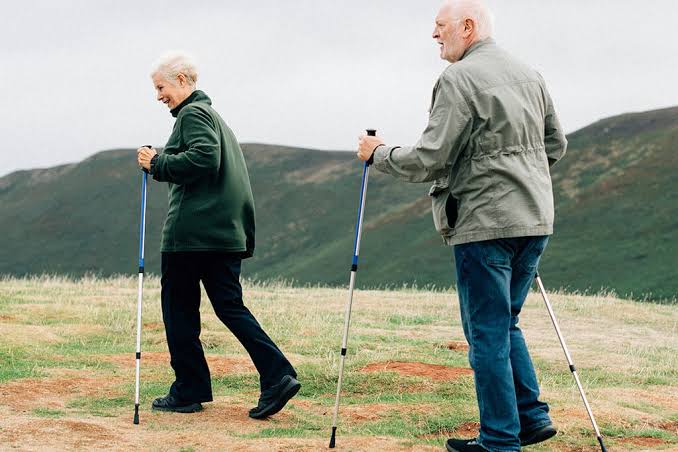
Daily Habits That Keep Seniors Active and Full of Vitality
Seniors can stay active and vibrant by nurturing daily habits that enhance both body and mind. A balanced diet, regular exercise, quality sleep, hydration, and mindful relaxation build physical strength and emotional stability. Social connections, hobbies, and mental challenges keep the spirit lively, while regular check-ups ensure health is monitored.
💪 Fitness Guru
35 min read · 13, Sep 2025

Introduction
Aging is a natural process, but how you age is largely influenced by your daily habits. Many seniors believe that slowing down is inevitable, yet science shows that consistent movement, a positive mindset, and mindful routines can help you stay vibrant and energetic well into your golden years.
Being “active” as a senior doesn’t necessarily mean intense workouts or strict diets. It’s about simple, sustainable habits—walking, stretching, balanced nutrition, social connection, and mental stimulation—that keep your body strong, your mind sharp, and your spirit youthful.
In this article, we’ll explore the daily habits that boost energy, prevent common age-related issues, and help seniors live with vitality and joy every day. Aging is a natural part of life, but it does not have to mean slowing down or losing the joy of living. Many seniors today are breaking the stereotype of old age being about rest and decline. Instead, they are proving that life after sixty can be vibrant, energetic, and full of purpose. The secret lies not in some complicated formula but in adopting simple daily habits that keep both the mind and body active. When these habits are practiced consistently, they create a foundation for long-lasting vitality.
The first key to staying energetic in the later years is movement. It does not necessarily have to be intense workouts or exhausting routines. Gentle yet regular exercise like morning walks, stretching, yoga, or light resistance training can work wonders. These activities keep the joints flexible, improve circulation, and enhance balance, which reduces the risk of falls. Even simple household activities like gardening, sweeping, or climbing stairs contribute to daily movement. The idea is to avoid a sedentary lifestyle. The body responds positively to activity at any age, and for seniors, regular movement not only strengthens muscles but also uplifts mood and keeps the mind sharp.
Hand in hand with movement comes nutrition. Food is the body’s fuel, and seniors need the right balance of nutrients to maintain strength and immunity. A diet rich in fruits, vegetables, whole grains, lean proteins, and healthy fats can provide energy throughout the day. Hydration is equally important, as dehydration often goes unnoticed in older adults. Limiting processed foods and excess sugar can also prevent unnecessary weight gain and keep chronic conditions like diabetes or hypertension in check. Preparing and enjoying meals can itself be a fulfilling daily habit, especially when done mindfully, savoring every bite rather than rushing through.
Another daily habit that boosts vitality is maintaining mental stimulation. The brain, just like the body, thrives on exercise. Reading books, solving puzzles, playing memory games, or learning new skills such as painting or music can keep the mind sharp. Seniors who engage in lifelong learning often report higher levels of happiness and mental clarity. Even staying updated with current events or having thoughtful conversations with friends and family can act as powerful brain exercises. The more the mind is challenged, the more resilient it becomes against age-related decline.
Equally vital is social connection. Loneliness is one of the biggest threats to seniors’ well-being, often leading to anxiety, depression, or even physical health issues. Making it a habit to connect daily with loved ones, whether through a phone call, a short visit, or community group activities, can make a world of difference. Sharing experiences, laughing, and supporting each other helps in maintaining emotional balance. Seniors who feel valued and connected tend to live with greater enthusiasm and purpose.
Good sleep is another cornerstone of vitality. Rest is the body’s natural way of repairing itself, yet many older adults struggle with sleep. Establishing a bedtime routine such as reading, listening to calm music, or practicing deep breathing can improve sleep quality. Avoiding heavy meals or screen time late at night also promotes restful sleep. When the body is well-rested, energy levels are higher during the day, and mood remains stable.
Equally powerful in maintaining vitality is cultivating a positive mindset. Aging can bring challenges, but focusing on gratitude and optimism can transform the way one experiences life. Daily practices such as writing down a few things to be thankful for, meditating, or simply appreciating the beauty of nature can bring joy and peace. A positive outlook not only reduces stress but also has a direct impact on physical health. Seniors who practice gratitude often experience lower blood pressure, stronger immunity, and greater resilience in the face of difficulties.
Staying curious about life also fuels vitality. Many seniors find renewed energy by exploring hobbies, volunteering, or traveling when possible. The habit of embracing new experiences keeps life exciting and meaningful. It provides a sense of purpose beyond routine and makes every day something to look forward to. Purpose itself is a powerful motivator, helping seniors get out of bed each morning with energy and drive.
Routine health care is another important habit. Regular checkups, taking prescribed medications on time, and monitoring vital signs like blood pressure or sugar levels can prevent small issues from turning into major problems. Seniors who are proactive about their health enjoy greater peace of mind and are able to focus more on living fully rather than worrying about illness.
Lastly, practicing kindness and giving back creates a cycle of vitality. Seniors who spend time helping others—whether it is mentoring young people, volunteering, or even offering a listening ear—often find that their own lives feel richer. Giving has been shown to release feel-good hormones that reduce stress and promote happiness. This daily habit nourishes the spirit and keeps the heart light.
The truth is, vitality in old age is not about chasing youth but about embracing life fully with habits that nurture the body, mind, and soul. Small actions performed consistently make the biggest difference. A morning walk, a balanced meal, a stimulating book, a heartfelt conversation, a restful night, or a grateful heart—each of these simple practices adds up to a life of energy and fulfillment. Seniors who commit to these habits discover that age is merely a number, and that every day can be lived with strength, joy, and purpose.
Why Staying Active Matters for Seniors
With age, the body undergoes changes like reduced muscle mass, weaker bones, slower metabolism, and lower energy levels. But regular activity and healthy routines can:
- Improve circulation and heart health
- Maintain strength and flexibility
- Reduce risk of falls and injuries
- Boost immunity and healing
- Keep memory sharp and prevent cognitive decline
- Enhance mood and emotional resilience
Aging may be inevitable, but decline doesn’t have to be. Consistency in small habits makes the biggest difference.
Key Daily Habits for Seniors’ Vitality
1. Morning Movement
Starting the day with light activity awakens the body and sets a positive tone.
- Gentle yoga, stretching, or tai chi improve flexibility.
- A short walk in the fresh air boosts circulation and vitamin D levels.
- Deep breathing exercises energize the body and calm the mind.
2. Balanced and Nutritious Eating
Nutrition is the fuel that powers vitality. Seniors need foods that support energy, digestion, and immunity.
- Prioritize fruits, vegetables, whole grains, and lean proteins.
- Include calcium-rich foods like milk, paneer, or leafy greens for bone health.
- Omega-3 sources like flaxseeds or fish reduce inflammation and support the brain.
- Stay hydrated—thirst signals weaken with age, so consciously drink 7–8 glasses of water daily.
3. Staying Socially Connected
Loneliness can drain vitality more than physical decline.
- Talk to family or friends daily.
- Join local groups, senior clubs, or spiritual gatherings.
- Even short interactions bring joy and boost mental health.
4. Regular Physical Exercise
Exercise doesn’t have to mean gyms.
- Brisk walking for 20–30 minutes maintains heart health.
- Light strength training with water bottles or resistance bands keeps muscles strong.
- Balance exercises like standing on one leg reduce fall risk.
5. Mental Stimulation
Keeping the brain active is as important as moving the body.
- Read books, solve puzzles, or learn something new.
- Engage in memory games or crosswords.
- Even teaching grandchildren or sharing stories stimulates thinking.
6. Quality Sleep
Rest is vital for healing and energy.
- Stick to a consistent sleep routine.
- Avoid heavy meals or caffeine close to bedtime.
- Create a calm sleep environment—dim lights, no screens, and a comfortable bed.
7. Gratitude and Mindfulness
Emotional well-being plays a huge role in vitality.
- Practice gratitude journaling or simple reflection each day.
- Meditation or prayer helps reduce stress and bring peace.
- Smiling and laughter naturally release feel-good hormones.
Morning to Night: A Daily Vitality Routine for Seniors
Morning
- Wake up with a glass of warm water.
- Do 10–15 minutes of stretching or yoga.
- Enjoy a nutritious breakfast like oats, fruits, or eggs.
Midday
- Take a 10–15 min walk after lunch.
- Engage in a hobby like gardening, painting, or reading.
- Connect with friends or family through a call or visit.
Evening
- Light exercise such as cycling on a stationary bike or simple home workouts.
- Have a balanced dinner with veggies, soup, or grilled food.
- Reflect on the day with gratitude before bed.
Weekly Practices for Long-Term Vitality
- Try 2–3 strength or balance training sessions weekly.
- Attend a group class, cultural event, or community activity.
- Schedule a relaxing activity like music, gardening, or walking in nature.
- Dedicate one day to trying a new recipe or hobby for mental freshness.
- Ensure weekly health check-ins (blood pressure, sugar if required).
Common Challenges Seniors Face and How to Overcome Them
Fatigue or Low Energy
- Solution: Eat small, frequent meals and stay hydrated. Gentle movement actually boosts energy.
Joint Stiffness or Pain
- Solution: Low-impact exercises like swimming or yoga reduce stiffness. Turmeric and omega-3s can help inflammation.
Lack of Motivation
- Solution: Set small goals. Find a buddy to walk or exercise with. Celebrate progress, no matter how small.
Poor Sleep
- Solution: Keep a consistent sleep routine. Avoid naps longer than 30 minutes. Use calming rituals like herbal tea.
Myths About Seniors and Activity: Busted!
“I’m too old to exercise.”
→ False! Even light movement adds years to life and life to years.
“Resting more keeps me healthier.”
→ Actually, too much rest weakens muscles and bones. Activity keeps you stronger.
“Only medicines can keep me energetic.”
→ Healthy habits and lifestyle changes often have a bigger impact than pills.
“It’s unsafe for seniors to lift weights.”
→ Light strength training under guidance is safe and prevents falls.
“Staying home is enough for safety.”
→ Isolation harms mental health. Safe social connections are vital.
Daily Habits That Add Joy
- Start mornings with sunlight—natural vitamin D uplifts mood.
- Keep plants, pets, or hobbies around for purpose and happiness.
- Practice kindness—helping others brings meaning and vitality.
- Celebrate small achievements—whether it’s completing a walk or trying a new recipe.
Conclusion
Staying vibrant as a senior is less about age and more about attitude and consistency. Simple habits like morning stretches, balanced meals, social connection, mental stimulation, and gratitude make a powerful difference in energy levels and overall health.
Remember: vitality doesn’t come from one big change, but from small daily steps that add up over time. Every mindful choice—from walking a little extra to eating colorful foods—fuels your body and keeps your spirit youthful.
So, if you want to feel stronger, live longer, and age gracefully—start today. Your body, mind, and heart will thank you tomorrow
Q&A Section
Q1:- Why is regular physical activity important for seniors’ vitality?
Ans :- Daily movement like walking, stretching, or light yoga improves flexibility, balance, and cardiovascular health, reducing the risk of falls and chronic illnesses.
Q2:- How does maintaining a balanced diet support active aging?
Ans :- Nutritious meals rich in proteins, fibers, vitamins, and minerals fuel energy, strengthen immunity, and help maintain muscle mass and bone strength.
Q3:- Why is staying socially connected vital for seniors’ well-being?
Ans :- Regular interaction with family, friends, or community groups prevents loneliness, enhances mood, and stimulates the mind, reducing risks of depression and cognitive decline.
Q4:- How does proper sleep contribute to seniors’ energy levels?
Ans :- A restful 7–8 hours of sleep rejuvenates the body, supports memory, and regulates mood, ensuring seniors remain alert and active during the day.
Q5:- Why should seniors engage in brain-stimulating activities daily?
Ans :- Reading, puzzles, or learning new skills keep the brain sharp, improve memory, and lower chances of dementia or age-related cognitive decline.
Q6:- How does hydration affect vitality in old age?
Ans :- Drinking enough water prevents fatigue, regulates body temperature, supports digestion, and maintains joint lubrication, keeping seniors active and comfortable.
Q7:- Why is practicing mindfulness or meditation beneficial for seniors?
Ans :- Meditation reduces stress, lowers blood pressure, and enhances emotional balance, helping seniors enjoy peace of mind and sustained energy.
Q8:- How does maintaining personal hobbies contribute to healthy aging?
Ans :- Gardening, painting, or music brings joy, purpose, and mental stimulation, while reducing stress and boosting overall satisfaction with life.
Q9:- Why should seniors schedule regular health check-ups?
Ans :- Early detection of health issues ensures timely treatment, helps manage chronic conditions, and keeps seniors confident in maintaining an active lifestyle.
Q10:- How does limiting screen time support seniors’ vitality?
Ans :- Reducing excessive screen use prevents eye strain, encourages more movement, and allows time for physical and social activities that promote longevity.
Similar Articles
Find more relatable content in similar Articles

Fitness Hacks for Long-Distance Truck Drivers...
Long-distance truck drivers fa.. Read More

Circadian Rhythm Fitness – Matching Workouts with Your Inter..
“Discover how aligning your wo.. Read More

Eco-Fitness: Training While Helping the Environment...
Eco-Fitness is a transformativ.. Read More

Military Fitness Secrets the Public Doesn’t Know...
“Discover the hidden methods b.. Read More
© 2024 Copyrights by rFitness. All Rights Reserved.